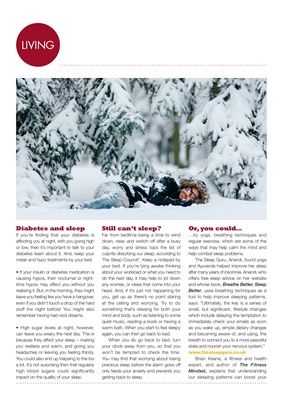
LIVINGLIVING
Diabetes and sleep
If you're finding that your diabetes is
affecting you at night, with you going high
or low, then it's important to talk to your
diabetes team about it. And, keep your
meter and hypo treatments by your bed.
• If your insulin or diabetes medication is
causing hypos, then nocturnal or nighttime hypos may affect
you without you
realising it. But, in the morning, they might
leave you feeling like you have a hangover,
even if you didn't touch a drop of the hard
stuff the night before! You might also
remember having had vivid dreams.
• High sugar levels at night, however,
can leave you weary the next day. This is
because they affect your sleep - making
you restless and warm, and giving you
headaches or leaving you feeling thirsty.
You could also end up traipsing to the loo
a lot. It's not surprising then that regularly
high blood sugars could significantly
impact on the quality of your sleep.
Still can't sleep?
Far from bedtime being a time to wind
down, relax and switch off after a busy
day, worry and stress tops the list of
culprits disturbing our sleep, according to
The Sleep Council*. Keep a notepad by
your bed. If you're lying awake thinking
about your workload or what you need to
do the next day, it may help to jot down
any worries, or ideas that come into your
head. And, if it's just not happening for
you, get up as there's no point staring
at the ceiling and worrying. Try to do
something that's relaxing for both your
mind and body, such as listening to some
quiet music, reading a book or having a
warm bath. When you start to feel sleepy
again, you can then go back to bed.
When you do go back to bed, turn
your clock away from you, so that you
won't be tempted to check the time.
You may find that worrying about losing
precious sleep before the alarm goes off
only feeds your anxiety and prevents you
getting back to sleep.
Or, you could…
…try yoga, breathing techniques and
regular exercise, which are some of the
ways that may help calm the mind and
help combat sleep problems.
The Sleep Guru, Anandi, found yoga
and Ayuverda helped improve her sleep
after many years of insomnia. Anandi, who
offers free sleep advice on her website
and whose book, Breathe Better, Sleep
Better, uses breathing techniques as a
tool to help improve sleeping patterns,
says: "Ultimately, the key is a series of
small, but significant, lifestyle changes
which include delaying the temptation to
immediately check your emails as soon
as you wake up, simple dietary changes
and becoming aware of, and using, the
breath to connect you to a more peaceful
state and nourish your nervous system."
www.thesleepguru.co.uk
Brian Keane, a fitness and health
expert, and author of The Fitness
Mindset, explains that understanding
our sleeping patterns can boost your